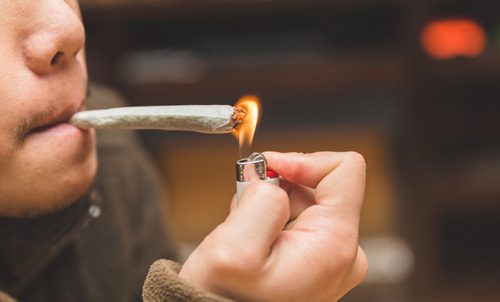
Understanding the Difference Between Dependence & Addiction
When determining if an individual has a problem with marijuana use, it’s important to distinguish between dependence and addiction. Sometimes, dependence is used as a synonym for addiction, even though it is possible to be dependent on marijuana without being addicted.
Marijuana dependence is the result of the brain adapting to regular cannabis consumption by reducing the production of and sensitivity to its own endocannabinoid neurotransmitters. When dependence occurs, a person will experience withdrawal symptoms if they are unable to use the drug.
Addiction refers to the feeling of helplessness a user has when it comes to attempting to regulate their marijuana consumption. Even when there is ample evidence that the drug is causing problems with their daily life, they are unable to change their behavior. They believe that using marijuana is the only way they can feel “normal” on a day-to-day basis.
10 Signs of a Potential Marijuana Use Disorder
Every person’s experience is different, but there are several common signs that suggest you may need to reevaluate your marijuana consumption:
1. You have unexplained chest pains.
People often talk about using medical marijuana for pain relief, but excessive marijuana consumption can cause chest pain and heart palpitations. In people with high blood pressure or diagnosed cardiovascular disease, marijuana use can increase the risk of a heart attack or stroke.
2. It’s hard to breathe.
Smoking marijuana can wreak havoc on your lungs. If you’re wheezing and short of breath, this is a sign that you need to change your behavior. Chronic smokers often end up with severe activity limitations due to impaired lung function.
3. You have abdominal pain that is relieved by hot water.
Cannabis Hyperemesis Syndrome is a condition that causes abdominal pain with nausea and vomiting that is relieved by a hot shower or bath. While hot water temporarily stops the symptoms, quitting marijuana cures the condition altogether.
4. You’ve experienced shakiness or tremors.
The stimulating effects of THC on the central nervous system and its interaction with the body’s dopaminergic signaling system can cause some heavy users to develop symptoms that are similar to what is seen in patients with multiple sclerosis or Parkinson’s disease.
5. You’ve experienced a white-out.
This phenomenon is associated with acute cannabis intoxication. When it happens, the color drains from a person’s face, and they experience weakness, nausea, vomiting, and temporary unconsciousness.
6. Your mental health is suffering.
Marijuana use can trigger anxiety, racing thoughts, and paranoia. It’s also known to exacerbate the symptoms of depression.
7. You’re feeling lethargic and unmotivated.
If your performance at work or school is suffering due to a general lack of motivation, this is a cause for concern. Long-term marijuana users have been shown to have lower levels of dopamine in the brain, which can lead to difficulty fulfilling daily responsibilities.
8. Your social life centers around using weed.
If you’re pulling away from nonsmokers to spend more time with those who use marijuana heavily, you’re putting yourself at risk. This is especially true if your social circle is encouraging you to mix marijuana with alcohol or to experiment with other types of addictive substances.
9. Other people are expressing concern about your behavior.
If your friends and family have tried to tell you that your marijuana consumption is becoming a problem, it’s worth listening to what they have to say. Often, loved ones notice changes in our mood and behavior that we overlook.
10. You’ve been in trouble with the law.
Pennsylvania allows for medical marijuana, but recreational marijuana remains illegal. Driving under the influence of cannabis regardless of your reason for using the drug is considered a felony.
Getting Help
If you think your marijuana use may be a problem, help is available. You’ll have access to an evidence-based substance abuse treatment program. As a result, you can learn to live a full and rewarding life without the use of addictive substances.
At Mountain Laurel Recovery Center, we believe that recovery is possible for all who desire it. Clients of our Pennsylvania residential drug and alcohol addiction treatment center have access to a full continuum of care. That includes detox, cognitive behavioral therapy, and holistic support services that build the foundation for a wellness-focused lifestyle. Contact us today to learn how you can take the first steps towards a brighter future.
